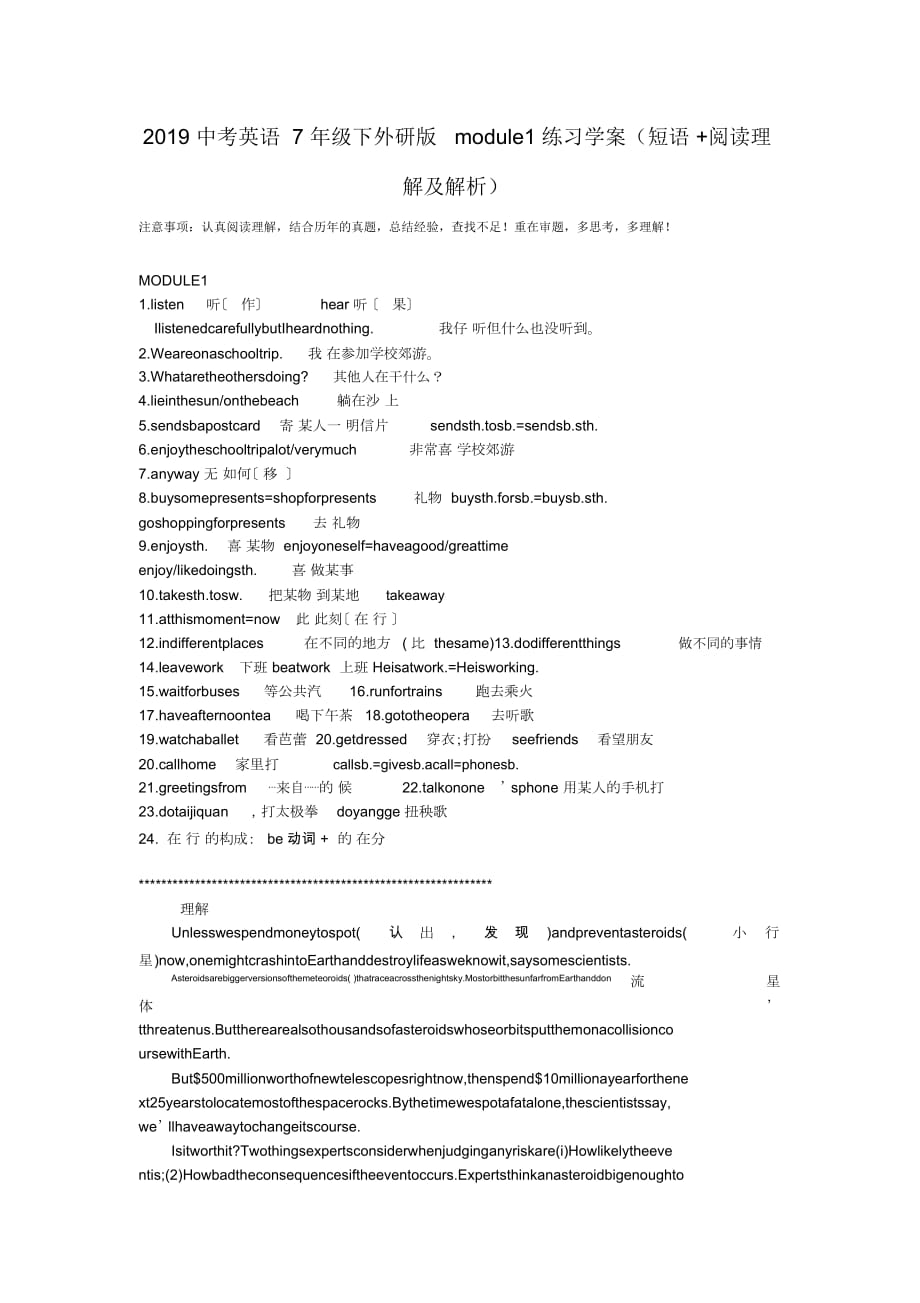《中考英語7年級(jí)下外研版module1練習(xí)學(xué)案(短語+閱讀理解及解析)》由會(huì)員分享�����,可在線閱讀��,更多相關(guān)《中考英語7年級(jí)下外研版module1練習(xí)學(xué)案(短語+閱讀理解及解析)(3頁珍藏版)》請(qǐng)?jiān)谘b配圖網(wǎng)上搜索��。
1��、
2019 中考英語 7 年級(jí)下外研版 module1 練習(xí)學(xué)案(短語 +閱讀理
解及解析)
注意事項(xiàng):認(rèn)真閱讀理解�,結(jié)合歷年的真題,總結(jié)經(jīng)驗(yàn)�,查找不足!重在審題����,多思考,多理解�����!
MODULE1
1.listen 聽〔 作〕 hear 聽 〔 果〕
IlistenedcarefullybutIheardnothing. 我仔 聽但什么也沒聽到。
2.Weareonaschooltrip. 我 在參加學(xué)校郊游���。
3.Whataretheothersdoing? 其他人在干什么?
4.lieinthesu
2���、n/onthebeach 躺在沙 上
5.sendsbapostcard 寄 某人一 明信片 sendsth.tosb.=sendsb.sth.
6.enjoytheschooltripalot/verymuch 非常喜 學(xué)校郊游
7.anyway 無 如何〔 移 〕
8.buysomepresents=shopforpresents 禮物 buysth.forsb.=buysb.sth.
goshoppingforpresents 去 禮物
9.enjoysth. 喜 某物 enjoyoneself=haveagood/greattime
3�、
enjoy/likedoingsth. 喜 做某事
10.takesth.tosw. 把某物 到某地 takeaway
11.atthismoment=now 此 此刻〔 在 行 〕
12.indifferentplaces 在不同的地方 ( 比 thesame)13.dodifferentthings
�
做不同的事情
14.leavework 下班 beatwork 上班 Heisatwork.=Heisworking.
15.waitforbuses 等公共汽 16.runfortrains 跑去乘火
4����、17.haveafternoontea 喝下午茶 18.gototheopera 去聽歌
19.watchaballet 看芭蕾 20.getdressed 穿衣;打扮 seefriends 看望朋友
20.callhome 家里打 callsb.=givesb.acall=phonesb.
21.greetingsfrom ?來自??的 候 22.talkonone ’ sphone 用某人的手機(jī)打
23.dotaijiquan ����,打太極拳 doyangge 扭秧歌
24. 在 行 的構(gòu)成: be 動(dòng)詞 + 的 在分
*****
5、**********************************************************
理解
Unlesswespendmoneytospot( 認(rèn) 出 ���, 發(fā) 現(xiàn) )andpreventasteroids( 小 行
星 )now,onemightcrashintoEarthanddestroylifeasweknowit,saysomescientists.
體
�
Asteroidsarebiggerversionsofthemeteoroids( )thatraceacrossthenightsky.Mosto
6��、rbitthesunfarfromEarthanddon
�
流
�
星
’
tthreatenus.Buttherearealsothousandsofasteroidswhoseorbitsputthemonacollisionco
ursewithEarth.
But$500millionworthofnewtelescopesrightnow,thenspend$10millionayearforthene
xt25yearstolocatemostofthespacerocks.Bythetimewespotafatalone,the
7�����、scientistssay,
we’ llhaveawaytochangeitscourse.
Isitworthit?Twothingsexpertsconsiderwhenjudginganyriskare(i)Howlikelytheeve
ntis;(2)Howbadtheconsequencesiftheeventoccurs.Expertsthinkanasteroidbigenoughto
destroylotsoflifemightstrikeEarthonceevery500,000years.Soundsprettyrarebutif
8�����、one
didfall.Itwouldbetheendoftheworld.
�
“ Ifwedon
�
’ ttakecareofthesebidasteroids,they
�
’
lltakecareofus,
�
” saysonescientist.
�
“ it
�
’ sthatsimple.
�
”
Thecure,though,mightbeworsethanthedisease.Dowereallywantfleets( 艦 隊(duì)
隊(duì) )ofnuclearweaponssittingaroundo
9�、nEarth? “ theworldhaslessfearfromdoomsday(
性)rocksthanfromagreatnuclearfleetsetagainstthem. ” SaidaNewYorkTimesarticle.
�
, 車
毀滅
1. Whatdoesthepassagesayaboutasteroidsandmeteoroids?
A.Theyareheavenlybodiesdifferentincomposition.
B.Theyareheavenlybodiessimilarinnature.
C.Theya
10��、remoreasteroidsthanmeteoroids.
D.Asteroidsaremoremysteriousthanmeteoroids.
2. WhatdoscientistssayaboutthecollisionofanasteroidwithEarth?
A.Itisveryunlikelybutthedangerexists.
B.Suchacollisionmightoccuronceevery25years.
C.CollisionsofsmallerasteroidswithEarthoccurmoreoftenthanexpected.
11�����、
D.It ’sstilltooearlytosaywhethersuchacollisionmightoccur.
3. Whatdopeoplethinkofthesuggestionofusingnuclearweaponstoalterthecourseofaste roids?
A.Itsoundspracticalbutitmaynotsolvetheproblem.
B.Itmaycreatemoreproblemsthanitmightsolve.
C.Itisawasteofmoneybecauseacollisionofasteroidswi
12�、thEarthisveryunlikely.
D.Furtherresearchshouldbedonebeforeitisprovedapplicable.
4. Wecanconcludefromthepassagethat__
A.Whilepushingasteroidsoffcoursenuclearweaponswoulddestroytheworld.
B.AsteroidsracingacrossthenightskyarelikelytohitEarthinthenearfuture.
C.Theworryaboutasteroidscanbel
13、efttofuturegenerationssinceitisunlikelytohapp
eninourlifetime.
D.WorkablesolutionsstillhavetobefoundtopreventacollisionofasteroidswithEart
h.
5..Whichofthefollowingbestdescribestheauthor
�
’ stoneinthispassage?
A.Optimistic(
�
樂觀的
�
)B.Critical(
�
批評(píng)的
�
)C.Objective(
�
客觀的
�
)D.Arbitrary(
�
武斷
的)
參考答案
BABDC�
 中考英語7年級(jí)下外研版module1練習(xí)學(xué)案(短語+閱讀理解及解析)
中考英語7年級(jí)下外研版module1練習(xí)學(xué)案(短語+閱讀理解及解析)

